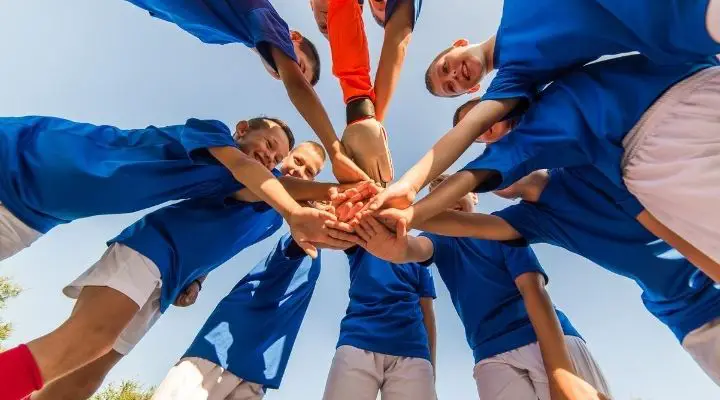How to Be a Great Teammate in Soccer (12 Tips)
When your players develop great relationships with each other, their environment becomes more positive, breeding support and motivation and making the team more cohesive, not just during games but outside of the sport, too.
This also makes things more fun (obviously).
If everyone’s a friend, your players will feel more relaxed and just have a good time playing with each other.
And if they’re less tense because they trust their teammates and their teammates trust them, they’ll win more games in the long run.
Aside from improved in-game performance, learning good teamwork will also help your players when they grow up.
Whatever career path they follow, they’ll shine anywhere as long as they know how to work as a member of a team.
Teaching your athletes to be great team players means you’re teaching them to be cooperative and contributing members of society.
Here are 12 traits you should instil in each of your players so that they become great teammates (and great people overall).

1. A Great Teammate Is a Lifelong Learner
Teach your players to always strive to improve.
Tell them that even if they’re not particularly good at a certain skill, they’ll eventually get it as long as they keep learning and practicing.
Anyone can be a good learner if they have the right motivation to do so, and there are plenty of things you can do to help push them in the right direction.
Here are a few:
1. Cultivate an atmosphere for reading by recommending soccer books to read and tell them what they’d gain for reading it.
2. Encourage questions and answer them to the best of your ability.
3. After each drill, block off time for group reflection to make sure the team takes away important lessons from them.
4. If you see your players working hard to improve their game, praise them for it.
5. Be enthusiastic about learning new things. If they see your excitement, it’ll rub off on them, too.
Take every opportunity to discover new things with your team.
Most importantly, make sure to focus on what they’re learning more than their performance, particularly when you’re teaching them new skills.
2. A Great Teammate Is Responsible
The best way to teach responsibility is to establish a set of rules and standards.
Tell your players that as members of the team, there are expectations to uphold.
No matter where they are, their actions are a representation of the team so they should always conduct themselves in a way that will make you and their teammates proud.
According to the Center for Parenting Education, there’s a link between self-esteem and responsibility. They say that if children have high self-esteem, they tend to be more responsible.
So, if you want to teach responsibility to your players, one way to do that is to help build their self-confidence.
Help them feel appreciated and capable.
If they have a sense of worth, power, and competency, then they’ll believe that they can handle the challenges that come to them and make a contribution to their environment.
3. A Great Teammate Makes Decisions Based on What’s Best for the Team
It’s not bad for an athlete to aspire to be a star player…
But it is bad when they choose to focus more on their personal ambitions instead of helping the team win.
You must teach your players the importance of sacrifice.
Sometimes players have to give up the spotlight in order to execute a play that will benefit the entire team.
Whether they need to pass, defend, run, or push up the field, great teammates do whatever needs to be done, even if they don’t feel like it.
They do what’s smart and effective, and they don’t really care about showing off their flashy skills or being a one-man show.
They’re unselfish, they stay true to their part in a strategy, and they can be counted on for support.
Make your players understand that they play as a unit working towards a common goal.

4. A Great Teammate Is a Friend to Everyone
Successful teams have friendships that go beyond the soccer field.
Good rapport within the playing group is vital for any team’s success.
So, make sure to encourage your players to get to know each other. Create an atmosphere where it feels like the entire team is a family.
If your players develop a tight bond with each other, communication will come much easier, especially on the field when it counts.
As the team’s coach, you can help foster friendships by taking them out on trips outside soccer practice.
Maybe go on a picnic or take them to an amusement park, or an easy way to have them bond is to simply fit brief ice-breaker games in your training schedule.
5. A Great Teammate Is a Source of Motivation and Support
Make your players understand that the team is only as strong as its weakest link, so it’s important that nobody gets left behind.
Each player has a responsibility to support and motivate everyone else.
If someone is struggling to learn a particular skill, it’s their job to improve but it’s also their teammates’ job to help them.
This is also why the previous trait is so important -- if you develop a close-knit team, your players will motivate and support each other because they’re all friends and they genuinely care.
And as a coach, you should be the first to motivate and support.
Include everyone - even unique personalities that you have trouble working with. If you have shy players, include them in the conversation.
You should also be a prime example of positivity, which will teach your players the value of optimism.
Great teammates know that mistakes happen and that it’s pointless to dwell on them.
So, if you teach your players to stay motivated even when things aren’t going so well for the team, they’ll just learn to shake it off and keep going.
6. A Great Teammate Is Honest and Respectful
When a player treats their teammates as close friends (or if they’re not close at all), sometimes it can be difficult to mention points of improvement.
Even though their intentions are pure, sometimes they might hesitate for fear of hurting their friend’s feelings.
But great teammates are honest, especially when it’s for a fellow player’s benefit.
This is why you should teach your players how to deliver constructive criticism.
Tell them that if they want to offer critical advice, they can do so by complimenting their teammate first, then offer their criticism, then end with a positive note.
On the other hand, remind your players to be open to criticism, too.
Tell them that great teammates don’t let constructive feedback pierce their emotions. Instead, they accept it with respect and use it as fuel during training to keep on improving.
In fact, great teammates are thankful for this kind of advice. They know that it’s not at all harmful; it’s even essential for growth.

7. A Great Teammate Gives Their All
Be very clear from the start that you expect your players to give no less than 100% of their effort.
Teach them to always work hard, to study the game, to keep on asking questions, and to keep on getting better at everything they’re trying to achieve.
During practice, you can even regale them with inspirational stories of legendary soccer players who always put the time and effort to improve.
In particular, explain to them how this helps the team as a whole.
8. A Great Teammate Goes the Extra Mile
Not only does a great teammate give 100% of their effort, but they also go beyond that.
Teach your players that as much as they can, they should always go beyond what’s expected of them.
Point out that there's no pressure, but if they have the chance to do more (more practice, more reading, etc.), then they should take every opportunity to get better.
Encourage them to attend practice earlier than usual, and announce that if someone wants to stay behind to practice a certain move, you’ll stay behind and help them.
Hard work is contagious. So if you can motivate just one player to work even harder, then their teammates would want to do the same.
9. A Great Teammate Knows Their Strengths and Weaknesses
If a player is familiar with their strengths and weaknesses, their ability to help the team vastly increases.
That’s because they’re aware of what they bring to the team - what they can and can’t do depending on the situation.
As a coach, it’s important that you help them reflect on their skills. Allot time during practice to help your players profile themselves so that they can evaluate their strengths and weaknesses.
Doing so helps them figure out which areas to improve on and will also increase their confidence in skills they’re good at, allowing them to maximize their strengths and leverage them.
This also improves their decision-making abilities.
The more attuned your players are to their strengths and weaknesses, the better they’ll be at thinking on their feet during games.

10. A Great Teammate Holds Themselves and Their Teammates Accountable
If a player wants to be a trustworthy member of the team, they should always hold themselves and their teammates accountable.
This player stays true to the rules set up by the coach, and they make sure everyone, including themselves, is prepared and giving their all to fulfill their roles.
A great teammate familiarizes all the strategies the team and coach have covered so far. They don’t miss practice, they keep up with school work and other responsibilities, and they always come prepared during matches.
This is an important value you should be teaching your athletes. And as their coach, you should be the first to hold your team accountable.
One way you can teach them accountability is to establish a “monitor” during practice.
Make sure that there’s a rotation for this role so that everyone has a chance to be a leader and bear that responsibility.
A monitor’s tasks depend on you…
You can ask them to be responsible for tracking attendance or rule violations, supervise drills, or maybe even read about a strategy or formation for them to explain to their teammates next practice.
Whoever the monitor is for that day, the extra responsibility will train them to hold themselves accountable and to look after their teammates, too, and make sure everyone is complying.
You should also remind the monitors to keep an eye for teammates who are lagging behind. Tell them that for everyone to be successful, those who have trouble keeping up should be picked up and supported.
The only way to succeed is as a team, so part of being accountable is to make sure everyone is helping each other.
Being accountable also means staying healthy. So remind your players to take care of their bodies outside of training.
11. A Great Teammate Knows How to Communicate Effectively
Communication during soccer matches isn’t easy, especially because players will be running around, trying to keep up with whatever the opponent is doing.
But great teammates can still communicate effectively, even in difficult games.
The key is to be able to communicate plans and reactions concisely within a limited amount of time.
To help with this, you and your team can come up with non-verbal signals for your players to use during specific instances that could happen in a match.
Effectivity of communication also increases when your players have good rapport with one another. This is why trait #4, befriending teammates, is so important.
12. A Great Teammate Is the Embodiment of Confidence and Humility
You can help your players feel more confident by praising them and making them feel better about themselves.
You can also teach them body language. Changing their posture is very easy to do, but they’ll feel a lot different just by doing that.
If a player is confident, it shines through and reassures the entire team. If they’re sure of themselves, they’ll help their teammates feel sure of themselves, too.
But make sure to remind them to balance confidence with humility.
The difference that this makes is that if someone is merely confident, they’ll think, “I can do it.” But if someone has just the right amount of confidence and humility, they’ll think, “We can do it.”
One is self-centric and the other is team-centric.
This balance of confidence and humility doesn’t just make a great teammate, it makes for a great leader, too.
Truth be told, what characterizes a leader isn’t confidence but humility.
Conclusion
These traits aren’t just helpful for making your athletes better team players. They’re also very valuable when they grow up, whatever career choice they end up pursuing.
As a coach, it might be overwhelming for you to be responsible for teaching them all of these characteristics.
It’s not as easy as simply giving them the instructions of a soccer drill or explaining a formation to them. This would require you to wire their mindsets for these traits to inhabit their actions.
If you’re feeling stuck on how to teach these to your players, the easiest way is to just practice these traits yourself.
As their coach, your behavior is also a method of teaching. If they see these traits in action through you, they’ll follow suit.

